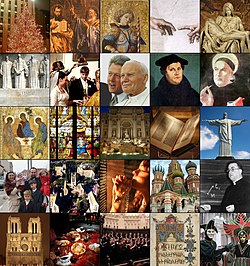The Netherlands
Forms of Christianity have dominated religious life in what is now the Netherlands for more than 1,200 years, [30] and by the middle of the sixteenth century the country was strongly Protestant (Calvinist). [31] The population of the Netherlands was predominantly Christian until the late 20th century, divided into a number of denominations. [32]
The provinces North Brabant and Limburg in the Netherlands are historically mostly Roman Catholic, therefore many of their people still use the term and some traditions as a base for their cultural identity rather than as a religious identity. Since the War of Independence the Catholics were systematically and officially discriminated against by the Protestant government until the second half of the 20th century, which had a major influence on the economic and cultural development of the southern part of the Netherlands. [33]
From the Reformation to the 20th century, Dutch Catholics were largely confined to certain southern areas in the Netherlands, and they still tend to form a majority or large minority of the population in the southern provinces of the Netherlands, North Brabant and Limburg.
However, with modern population shifts and increasing secularization, these areas tend to have fewer and fewer religious Catholics. Since 1960 the emphasis on many Catholic concepts including hell, the devil, sinning and Catholic traditions like confession, kneeling, the teaching of catechism and having the host placed on the tongue by the priest rapidly disappeared, and these concepts are nowadays seldom or not at all found in modern Dutch Catholicism. The southern area still has original Catholic traditions including Carnival, pilgrimages, rituals like lighting candles for special occasions and field chapels and crucifixes in the landscape, giving the southern part of the Netherlands a distinctive Catholic atmosphere, with which the population identifies in contrast to the rest of the Netherlands. The vast majority of the (self-identifying) Catholic population in the Netherlands is now largely irreligious in practice. Research among Catholics in the Netherlands in 2007 shows that even among religious Dutch Catholics only 27% can be regarded as theist, 55% as ietsist, 17% as agnostic and 1% as atheist. [34]

